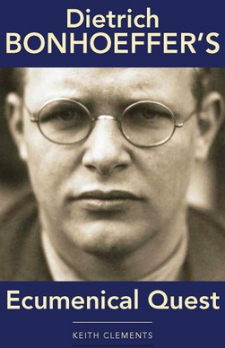Dietrich Bonhoeffer’s Ecumenical Quest
Keith Clements' important book is a serious challenge to all. It will be interesting to see who takes it up
 Dietrich Bonhoeffer’s Ecumenical Quest
Dietrich Bonhoeffer’s Ecumenical Quest
By Keith Clements
WCC Publications
ISBN: 978-2-8254-1656-3
Reviewed by Alec Gilmore
After listening to Dietrich Bonhoeffer addressing an ecumenical conference in 1934 one member said ‘Bonhoeffer had charged so far ahead that the conference could not follow him’. Readers who thought the church caught up with him in the 1960s may need to think again. Keith Clements' book suggests we have still not got there.
Despite Bonhoeffer’s manifold skills as pastor, academic, theological teacher and seminary director, not to mention his role as a leading light in the Confessing Church and a willing participant in the plot to overthrown Hitler for which he paid with his life, Clements unpacks the ecumenical movement as the central thread which runs throughout his life, leaving a challenge to which the churches have still not been able satisfactorily to respond.
To some Bonhoeffer’s approach to Christianity (a world ‘come of age’ and no longer in need of religion) may seem a million miles away from ecumenism, then understood as wrestling with divisive doctrines (and dogmas) and dreaming of closer inter-church relationships.
Bonhoeffer’s ecumenism was different. Undoubtedly an ecumenical giant whose writings have been absorbed by all the churches and who rubbed shoulders naturally with the ‘ecumenical greats’ the relationship his ecumenism was always going to be less than comfortable. He was a ‘stirrer’ who had spotted the Movement’s blind spot.
Interestingly enough, he never decided to become an ecumenist. His ecumenism was a byproduct of his open mind, a search for truth, the centrality of Christ, wide travel and a readiness to meet, engage with, listen to and learn from others, as a result of which he came to appreciate the breadth of his own understanding of God, the church and the world.
The Church Struggle in the 1930s between the statements required of the German church leadership and the scepticism of Bonhoeffer and a few others (including Niemöller) is carefully documented, including the story of what happened from 1933 onwards as ecumenical ‘academic discussion had to give way to action’.
This is where Clements breaks new ground by inviting us to see what was happening through the lens of Bonhoeffer’s approach to the ecumenism, thereby enriching our picture of his struggle, providing fresh insight into the background to Ethics (‘a work of well-nigh universal significance . . . shot through with an ecumenical perspective [with] a vision of Christian responsibility in and for the whole oikumene, the inhabited earth’) and perhaps more so to the familiar Letters and Papers and popular (mis)understanding of ‘religionless Christianity’ and ‘a world come of age’, as well as to the ecumenical movement.
As a result Bonhoeffer moved a long way from ‘Jesus Christ as the centre of human existence’ [Discipleship, 1933-37] to Christ as the centre of ‘the whole human realm’.
In his ‘world come of age’ he sees the need for ‘a new ecumenism as inter-confessional questions lose significance and reality and humankind poses questions to which no single tradition has answers, leading to separate confessional identities constantly demanding repeated and increasingly sophisticated self-justification which simply distracts from the need to face the mature world. Religionless Christianity is the ultimate logic of ecumenism. (Italics mine.)
A final chapter, summarising the issues still seeking resolution, traces the individualistic and inimitable footprint of Bonhoeffer all over the rest of the ecumenical movement up to the present thereby demonstrating what we are to understand by ‘He, being dead, yet speaketh’.
An important piece of work which merits far more attention than I fear it will get. To most people over 60 Bonhoeffer tends to be ‘yesterday’ and nobody under 60 can fully appreciate the tension aroused first by the war years and then by the theological upheavals of the 1960s. No doubt the few — the very few — committed to ecumenism and still working on these issues in a situation markedly different from Bonhoeffer’s will welcome it.
Whether it ever gets through to the grass roots will depend on church leadership and (sadly) contemporary church leaders have allowed crucial ecumenical issues to go off the boil, to be swept under the carpet or (in some cases) positively discouraged. Clements book is a serious challenge to all. It will be interesting to see who takes it up.
The Revd Alec Gilmore is a Baptist minister
Baptist Times, 12/06/2015